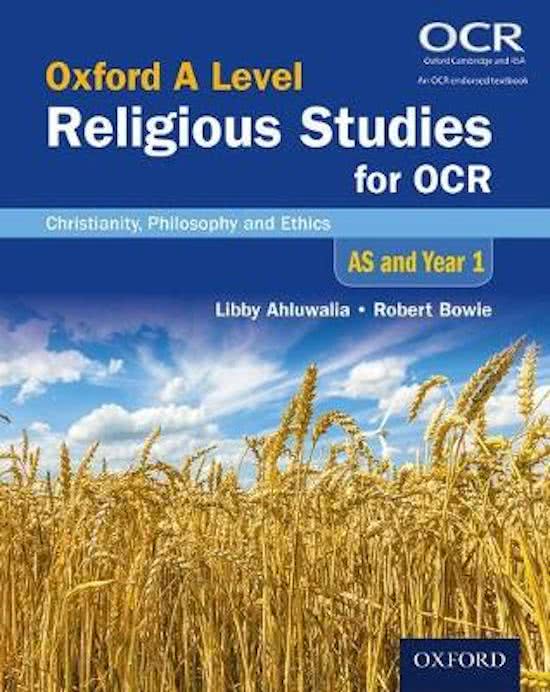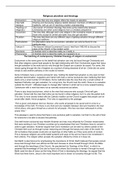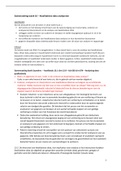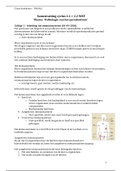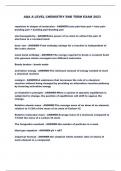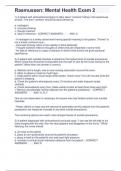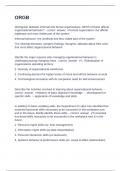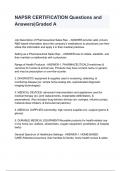Religious pluralism and theology
Exclusivism The view that only one religion offers the means to salvation
Inter-faith Sharing and discussing religious beliefs between members of different religious
dialogue traditions, with an aim of reaching a better understanding
Theology of The branch of Christian theology that looks at the relationship between
religion(s) Christianity and other world religions from a Christian perspective
Inclusivism The view that, although one’s own religion is the normative means of salvation,
those who accept its central principles may also get salvation
Pluralism The view that there are any different ways of getting salvation through different
religious traditions
Particularism An alternative name for exclusivism; salvation can only be found in one
particular way
Vatican II The Second Vatican Ecumenical Council, held from 1962-65 to discuss the
place of the Church in the modern world
Noumena A Kantian term to describe reality as it really is
Phenomena A Kantian term to describe reality as it appears to us
The teaching of contemporary Christian theology of religion on exclusivism
Exclusivism is the name given to the belief that salvation can only be found through Christianity and
that other religions cannot lead people to the right relationship with God. Exclusivists argue that Jesus
brought salvation to the world and so only through the Gospel can a person be saved. For some, this
means going through the rite of baptism as a symbol of being cleansed of all sin. Christ did not come
simply to add another pathway on the routes to heaven.
Some Christians have a narrow exclusivist view, holding the belief that salvation is only open to their
particular denomination. Augustine and Calvin both took a narrow exclusivist view, believing that God
elects only a small number of Christians. Some Catholics take the view that only a small number of
baptised Catholics can gain salvation; for a long time, the Church took the motto “there is no salvation
outside the Church”. Attitudes began to change after Vatican II which led to a more outward-looking
Catholicism with a view that were not as narrowly exclusivist as before.
There is also broad exclusivism, which is the view that everyone who accepts Christ will gain
salvation. Some hold the view that truths can be found in other religions, but it is only the partial truth.
This view is more closely linked with the Catholic tradition as the Church suggest that people can be
saved after death, hence purgatory. This view is supported by the passage:
“This is good, and pleases God our Saviour, who wants all people to be saved and to come to a
knowledge of the truth. For there is one God and one mediator between God and mankind, the man
Christ Jesus, who gave himself as a ransom for all people. This has now been witnessed to at the
proper time.”
This passage is used to show that there is one exclusive path to salvation, but that it is the will of God
for everyone to be able to access that pathway.
One well-known exclusivist was Hendrik Kraemer and was very influential for Christian missionaries
that were working in non-Christian countries as he emphasised that non-Christians have to convert in
order to gain salvation. Kraemer argued that God’s revelation can be seen by others outside of the
Christain faith such as through human reasoning and through the beauty and order of the world. He
did not believe that people could pick out teachings of other faiths as if they were points of contact.
This is because religions are entire belief systems and ways of live and so have to be considered in
their entirety. The religion either accepts the salvation offered by Christ or it does not.
Karl Barth is also famous for emphasising the importance of Christ. Barth believed that people cannot
know God through their own efforts but that God chooses to show himself through Christ, the Bible
and through the teachings of the Church. He popularised his ‘theology of the Word’, in which he
asserted that knowledge of God can be found only where God chooses to reveal it through his word.
Barth used his idea of Jesus as the living Word of God in developing his theology; he argued that the
Word has three forms. Jesus is the most important and is shown to humanity through his life. The
, second is the Bible, which is a witness to the Word and the third is the Church, bringing and spreading
the Gospel to people. Christ is the most important as he is reliable as he is the Word and so cannot
be found through human efforts.
Inclusivism in Christian theology
Some inclusivists accept the idea that salvation is still possible for the individual who turns to
Christianity after death, others adopt the idea that God’s omnibenevolence leaves open a possibility of
salvation even for non-Christians as they hold the belief that other religions can have some truth to
them.
Karl Rahner
Rahner believed that Christianity was the true absolute religion but went onto explain that this view
seemed to exclude anyone who lived before Christ and anyone who has not been able to hear about
the Bible, which for Rahner, did not seem to fit with an all-wise God.
Religions other than Christianity must therefore have some means of aiding their followers towards
the saving grace offered by God. Rahner argued that Christ must be able to give salvation to those,
through no fault of their own, have not been able to respond to Christianity. Therefore, there could be
partial truth in other religions. Once someone who belongs to a religion other than Christianity has
heard about the salvation offered by Christ, then that person should become a Christian in order to be
saved, as there would be no excuse to reject the gospel. Rahner rejected the idea that all religions are
in some way equal paths to God.
Kraemer, the exclusivist thinker, argued that non-Christian religions are little more than misguided
attempts by some people to try and find the truth for themselves so are therefore cultural constructs
rather than responses to revelation. However, Rahner used examples from the Bible of figures who
were praised for the faith but lived in the Old Testament so could not respond to Jesus such as
Abraham, Moses and Job. job for example, states that “I know that my redeemer lives, and that in the
end he will stand on the earth”. Rahner used these examples to show that the Bible supports the view
that people who do not know Christ can have genuine faith in God and that God recognises this. He
called these people ‘anonymous Christians’; they do not call themselves Christians, they have not
been baptised and do not go to Church but in their decisions and attitudes they are turning to Christ
without knowing it.
In St Paul’s letter to the Romans he states: (The Gentiles) “They show that the requirements of the
law are written on their hearts”. This passage can be used to support the idea that non-believers can
still have an intuitive sense for Christ. This view can also be shown through the parable of the Sheep
and the Goats in which Jesus talks about visiting the poor and looking after the sick.
Rahner’s view has not been accepted by the Catholic Church. Hans Urs von Balthasar emphasised
that salvation was based on Jesus’ sacrifice and resurrection. He reminded his readers of Saint
Cordula who knew that the Huns were attacking Christians and who first went and hid but then came
out as she remembered that death was not final and was martyred. Balthasar argued that the Church
should not go into hiding in the modern world or present a watered-down version of the Christian
message in order to appease other faiths.
Pluralism
Pluralists often hold the view that many different religions can have value and the potential to lead
their followers to salvation. Pluralists tend to argue that different religions share the same ultimate
goal. The belies can practices associated with different religions arise because of human culture, and
these differences are only superficial. The parable of the blind men and the elephant is often used by
pluralists to support their views; blind men encounter an elephant and they all have one part of it,
every man has a different understanding of what the elephant is like but they are all encountering the
same animal.
John Hick
Exclusivism The view that only one religion offers the means to salvation
Inter-faith Sharing and discussing religious beliefs between members of different religious
dialogue traditions, with an aim of reaching a better understanding
Theology of The branch of Christian theology that looks at the relationship between
religion(s) Christianity and other world religions from a Christian perspective
Inclusivism The view that, although one’s own religion is the normative means of salvation,
those who accept its central principles may also get salvation
Pluralism The view that there are any different ways of getting salvation through different
religious traditions
Particularism An alternative name for exclusivism; salvation can only be found in one
particular way
Vatican II The Second Vatican Ecumenical Council, held from 1962-65 to discuss the
place of the Church in the modern world
Noumena A Kantian term to describe reality as it really is
Phenomena A Kantian term to describe reality as it appears to us
The teaching of contemporary Christian theology of religion on exclusivism
Exclusivism is the name given to the belief that salvation can only be found through Christianity and
that other religions cannot lead people to the right relationship with God. Exclusivists argue that Jesus
brought salvation to the world and so only through the Gospel can a person be saved. For some, this
means going through the rite of baptism as a symbol of being cleansed of all sin. Christ did not come
simply to add another pathway on the routes to heaven.
Some Christians have a narrow exclusivist view, holding the belief that salvation is only open to their
particular denomination. Augustine and Calvin both took a narrow exclusivist view, believing that God
elects only a small number of Christians. Some Catholics take the view that only a small number of
baptised Catholics can gain salvation; for a long time, the Church took the motto “there is no salvation
outside the Church”. Attitudes began to change after Vatican II which led to a more outward-looking
Catholicism with a view that were not as narrowly exclusivist as before.
There is also broad exclusivism, which is the view that everyone who accepts Christ will gain
salvation. Some hold the view that truths can be found in other religions, but it is only the partial truth.
This view is more closely linked with the Catholic tradition as the Church suggest that people can be
saved after death, hence purgatory. This view is supported by the passage:
“This is good, and pleases God our Saviour, who wants all people to be saved and to come to a
knowledge of the truth. For there is one God and one mediator between God and mankind, the man
Christ Jesus, who gave himself as a ransom for all people. This has now been witnessed to at the
proper time.”
This passage is used to show that there is one exclusive path to salvation, but that it is the will of God
for everyone to be able to access that pathway.
One well-known exclusivist was Hendrik Kraemer and was very influential for Christian missionaries
that were working in non-Christian countries as he emphasised that non-Christians have to convert in
order to gain salvation. Kraemer argued that God’s revelation can be seen by others outside of the
Christain faith such as through human reasoning and through the beauty and order of the world. He
did not believe that people could pick out teachings of other faiths as if they were points of contact.
This is because religions are entire belief systems and ways of live and so have to be considered in
their entirety. The religion either accepts the salvation offered by Christ or it does not.
Karl Barth is also famous for emphasising the importance of Christ. Barth believed that people cannot
know God through their own efforts but that God chooses to show himself through Christ, the Bible
and through the teachings of the Church. He popularised his ‘theology of the Word’, in which he
asserted that knowledge of God can be found only where God chooses to reveal it through his word.
Barth used his idea of Jesus as the living Word of God in developing his theology; he argued that the
Word has three forms. Jesus is the most important and is shown to humanity through his life. The
, second is the Bible, which is a witness to the Word and the third is the Church, bringing and spreading
the Gospel to people. Christ is the most important as he is reliable as he is the Word and so cannot
be found through human efforts.
Inclusivism in Christian theology
Some inclusivists accept the idea that salvation is still possible for the individual who turns to
Christianity after death, others adopt the idea that God’s omnibenevolence leaves open a possibility of
salvation even for non-Christians as they hold the belief that other religions can have some truth to
them.
Karl Rahner
Rahner believed that Christianity was the true absolute religion but went onto explain that this view
seemed to exclude anyone who lived before Christ and anyone who has not been able to hear about
the Bible, which for Rahner, did not seem to fit with an all-wise God.
Religions other than Christianity must therefore have some means of aiding their followers towards
the saving grace offered by God. Rahner argued that Christ must be able to give salvation to those,
through no fault of their own, have not been able to respond to Christianity. Therefore, there could be
partial truth in other religions. Once someone who belongs to a religion other than Christianity has
heard about the salvation offered by Christ, then that person should become a Christian in order to be
saved, as there would be no excuse to reject the gospel. Rahner rejected the idea that all religions are
in some way equal paths to God.
Kraemer, the exclusivist thinker, argued that non-Christian religions are little more than misguided
attempts by some people to try and find the truth for themselves so are therefore cultural constructs
rather than responses to revelation. However, Rahner used examples from the Bible of figures who
were praised for the faith but lived in the Old Testament so could not respond to Jesus such as
Abraham, Moses and Job. job for example, states that “I know that my redeemer lives, and that in the
end he will stand on the earth”. Rahner used these examples to show that the Bible supports the view
that people who do not know Christ can have genuine faith in God and that God recognises this. He
called these people ‘anonymous Christians’; they do not call themselves Christians, they have not
been baptised and do not go to Church but in their decisions and attitudes they are turning to Christ
without knowing it.
In St Paul’s letter to the Romans he states: (The Gentiles) “They show that the requirements of the
law are written on their hearts”. This passage can be used to support the idea that non-believers can
still have an intuitive sense for Christ. This view can also be shown through the parable of the Sheep
and the Goats in which Jesus talks about visiting the poor and looking after the sick.
Rahner’s view has not been accepted by the Catholic Church. Hans Urs von Balthasar emphasised
that salvation was based on Jesus’ sacrifice and resurrection. He reminded his readers of Saint
Cordula who knew that the Huns were attacking Christians and who first went and hid but then came
out as she remembered that death was not final and was martyred. Balthasar argued that the Church
should not go into hiding in the modern world or present a watered-down version of the Christian
message in order to appease other faiths.
Pluralism
Pluralists often hold the view that many different religions can have value and the potential to lead
their followers to salvation. Pluralists tend to argue that different religions share the same ultimate
goal. The belies can practices associated with different religions arise because of human culture, and
these differences are only superficial. The parable of the blind men and the elephant is often used by
pluralists to support their views; blind men encounter an elephant and they all have one part of it,
every man has a different understanding of what the elephant is like but they are all encountering the
same animal.
John Hick

